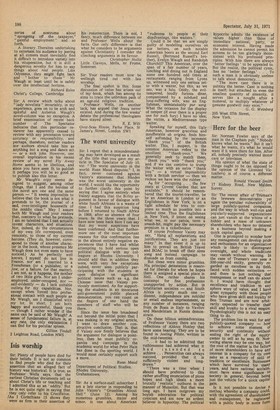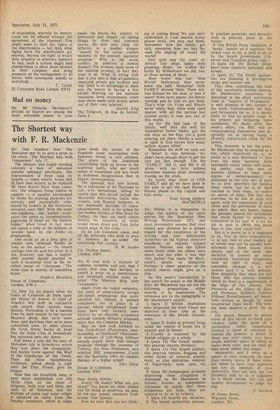Here for the beer
Sir: Norman Fowler says of the man in the Clapham pub: "Nobody knows what he wants." But it isn't what he wants, it's what he would want if it were there for him. After all, nobody precisely wanted motor• cars or television.
His opinion of what the state of things ought to be (as opposed to the opinion of the Licensed Victuallers) is of course a different matter.
Ronald Vincent ,Smith 17 Rodney Road, New Malden, Surrey.
Sir: The recent affair of Truman's the brewers demonstrates yet again the peculiar vulnerability of large publicly-quoted companies, and the way in which well-run and popularly-supported organizations can just vanish at the whims of a bidder and a mass of unknown shareholders who have no interest in a business beyond making a quick capital gain.
One is prompted to wonder bow any management can develop pride and enthusiasm for an organization which is likely to disintegrate overnight, and whole traditions may vanish without warning. In the case of Truman's one sees a 300-year-old entity, generally regarded as excellent in its field, faced with sudden extinction — and there is just nothing that management or staff can do about it. I would have thought that excellence and tradition in any sphere were of value, and I have great sympathy with those people who have given skill and loyalty to Ben Truman and are now arbitrarily expected to transfer their skill and loyalty to a rival empire. Psychologically this is not an easY thing to do.
The problem lies in wait for anY publicly-quoted company — hoW to achieve some element of security and continuity without ending the right of the equity' owner to sell as he sees fit. Nonvoting shares may be one way, but the root of the matter is the failure of more shareholders to have anY interest in a company for its own sake as a repository of skill or tradition or excellence. Businesses which have survived for ,rnanY years, and have national ,acclairn, must have some significance t° society in general, beyond beinq just the vehicle for a quick capital gain.
Is it not possible to devise a method whereby a company could, with the agreement of shareholders and management, be registered with a public body in some faro of trusteeship, whereby its identity could not be effaced without the agreement of the trustees? This might seem to limit the rights of the shareholders — but then, what rights have the shareholders got anyway, beyond the right to wreck their property in arbitrary fashion? In fact, such a system might lead shareholders to show more interest in their company, and bring pressure on the management to do better, with consequent benefit to everybody.
C. Carter 22 Culverden Road London SW12











































 Previous page
Previous page